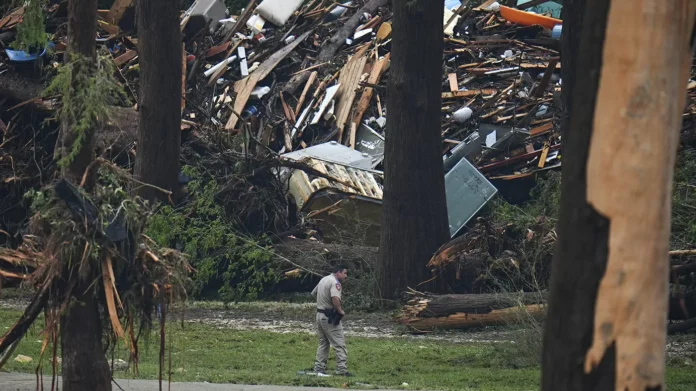In the wake of the devastating floods that have recently ravaged Texas, a new poll conducted by The Economist/YouGov has shed light on the sentiments of Americans towards the government’s handling of the natural disaster. The poll, which surveyed a representative sample of Americans, revealed that more than half of the respondents believe that the government could have prevented many of the deaths caused by the flood, if they had taken better precautions.
The damage wrought by the floods in Texas is colossal – dozens of lives have been lost, homes have been destroyed, and entire communities have been displaced. It is a tragedy of unprecedented proportions, and the American people are understandably looking for answers. The poll, which was conducted in the aftermath of the floods, has exposed a deep-seated concern and frustration among the citizens, who believe that more could have been done by the government to mitigate the impact of the disaster.
When asked if they thought that “most of the deaths from the floods in Texas could have been avoided if the government had been better”, a resounding 53% of the respondents answered in the affirmative. This is a significant number, and it reflects the growing dissatisfaction among the public regarding the government’s disaster management capabilities. The floods in Texas are not an isolated incident – they are the latest in a series of natural disasters that have struck the country in recent years. Yet, it seems that not enough has been done to improve disaster preparedness, and the people are beginning to demand accountability.
The sentiment of the public is understandable when one looks at the numbers. The United States has been hit by a series of catastrophic natural disasters in recent years, each one more severe than the last. In 2020 alone, the country has already experienced widespread wildfires, hurricanes and now, floods. The frequency and severity of these events have increased drastically in the last decade, and yet, there seems to be a lack of urgency in addressing the root causes of these disasters. The government’s response to such disasters has been largely reactive, rather than proactive, and this has resulted in significant loss of life and property.
Moreover, the poll also revealed that 44% of Americans believe that the government’s response to the floods in Texas was “not good enough”. This is telling, as it indicates a widespread dissatisfaction with the government’s handling of the situation. The floods have exposed the flaws in the current disaster management system and have highlighted the need for a comprehensive and proactive approach towards disaster preparedness. It is not enough to simply react to disasters – the government needs to take proactive steps to mitigate their impact, and this sentiment is shared by a majority of Americans.
However, amidst all the criticism, there is also a glimmer of hope. The poll revealed that 55% of Americans believe that the government can learn from the floods in Texas and improve their response to future disasters. This shows that the people are not disillusioned – they believe that the government has the potential to do better. It is now up to the government to take this opportunity and make the necessary changes to ensure that such disasters do not wreak havoc in the future.
In the aftermath of the floods, it is heartening to see that the people of America have come together to support those affected by the disaster. However, it is also a time for introspection and reflection. The floods in Texas have shown that the government needs to do more to protect its citizens and prevent such tragedies from occurring. It is time for the government to take a more proactive and comprehensive approach towards disaster management, and the people have made it clear that they expect nothing less.
In conclusion, the recent poll conducted by The Economist/YouGov has revealed the sentiments of Americans towards the government’s handling of the floods in Texas. The majority of the respondents believe that the government could have prevented many of the deaths, and their response to the disaster was not adequate. However, there is also a sense of hope that the government can learn from this and do better in the future. The floods in Texas have exposed the flaws in our disaster management system, and it is time for the government to take decisive action to address these issues. Only then can we prevent such tragedies from occurring in the future and ensure the safety and well-being of our citizens.

